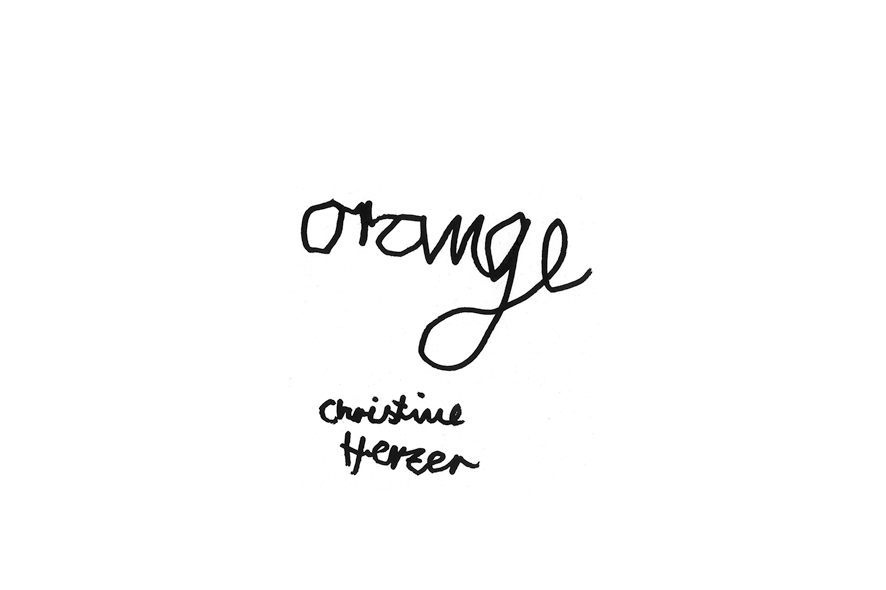
Orange
Christine Herzer
Ugly Duckling Presse
Review by Abby Paige
“Poets are containers,” Christine Herzer asserts and further, “containers deserve respect.” The image of the container is central in her new chapbook, Orange. A container may be a receptacle, in that it may receive, or an enclosure, in that it may seal something off. It may be durable or porous, transparent or opaque. Likely it is filled with or holds something—a substance other than its own—which gives the container purpose and perhaps even comes to define it. A container is, according to Herzer, often “powerless over its insides.” It may protect its contents from outside contamination, or it may protect the outside world from a danger it contains. Perhaps it is this labour of holding and protecting, defining and mediating the relationship between within and without, that makes containers worthy of respect.
Orange is a container, too, less for poems than for Herzer’s assertions, questions, and what she calls “language situations.” These include recollections of important sandwiches and television programs from childhood; the hiring of “a professional lover” who helps her to choose a container for her fears (spoiler alert: an orange refrigerator), and frustrated efforts to understand what it means to deserve, to provide, to desire, and indeed, to contain. What does the poet contain? What is the value of those contents? And how can the poet transfer those contents to the page?
The page, rather than the line, is Herzer’s primary unit of exploration. Orange is rendered mostly in prose, but margins and other blank spaces are manipulated. The size, format, and even colour of the text is varied in order to explore how these influence and inflect meaning. Herzer is a visual artist as well as a poet. Her poetry, rather than a separate literary pursuit, is an extension of her visual arts practice. A recent series of “writing drawings,” which can be seen on her website, uses repetition, over-writing, and erasure to explore visually how words hold or leak meaning. Orange does similar work, attempting to engage language as a representational medium.
While the term “experimental” is often used carelessly or even pejoratively to classify poetry that is unconventional or difficult, it seems the appropriate descriptor here: Herzer is engaged in a language experiment. She places words onto the page and observes their behaviour, attempting to understand how—or perhaps even whether—they can be used to externalize experience. The reader’s place within this experiment is that of an observer, but one who is joining the audience with the show already in progress. “I have been following the desires of Christine Herzer since 2002,” Herzer writes. “I wanted to continue. I want to continue.” This in-progress feeling disoriented me when I first encountered Herzer’s work at the MFA program we both attended a decade ago; I wanted to be brought up to speed. But her poems represent without explanations. She uses words less to communicate than to echolocate.
Herzer gestures toward profoundly political concerns such as gender, violence, and exploitation—but without opining. She deftly sidesteps any temptation toward argument, maintaining instead a methodically, even lovingly, questioning posture. She composes each page as a space of encounter, which she seems to acknowledge when she writes:
I’m attracted to emptiness.
I’m attracted to empty spaces, by empty I mean silent not silenced or repressed,
by empty I mean free;
The book closes with several quotations, including one by the Polish dramatist Jerzy Grotowski: “In life the first question is how to be armed; in art it is how to be disarmed.” An unflinching dedication to this notion self-disarmament animates Orange. “Writing is a window,” Herzer declares, and later, “Windows are skin.” If skin is a kind of container, it is a porous one, soft and permeable, and the nakedness at work here is of a particularly powerful kind, where the inner self and the outer world are pressed together along that porous boundary and bleed into one another, uncontained.
Abby Paige is a writer and theater creator whose poems have appeared in the U.S. and Canada, recently in Room Magazine and Arc Poetry Magazine, where two were shortlisted for the 2017 Poem of the Year. Her own chapbook, Other Brief Discourses, was published by Ottawa’s above/ground press. She currently lives in New Brunswick.